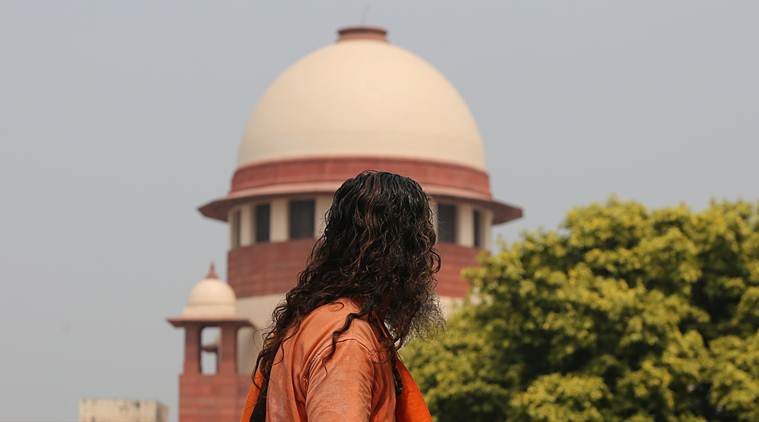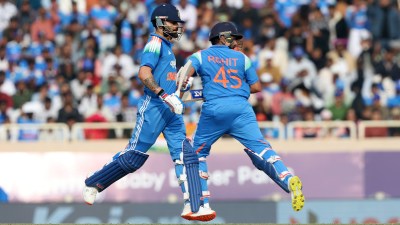The Supreme Court examining the historic rule and legitimacy of action of emperors such as Babur and Aurangzeb will “open a Pandora’s box”, the Uttar Pradesh Sunni Central Waqf Board said on Monday. The Board questioned whether the Babri Masjid would be delegitimised merely because “something” was found under it during digging by archeologists.
“If Babur gets involved, Ashoka’s actions will also be judged,” senior advocate Rajeev Dhavan, appearing for the Muslim parties, told a five-judge Constitution bench headed by CJI Ranjan Gogoi, adding “please don’t rewrite history.”

The bench, also comprising Justices S A Bobde, D Y Chandrachud, Ashok Bhushan and S A Nazeer, is hearing appeals against the 2010 verdict of Allahabad High Court, which ordered a three-way division of the disputed 2.77 acres.
Dhavan was responding to arguments by the Hindu side that Babri Masjid was not a valid mosque, as it did not comply with requirements of Sharia law.
Questioning this, Dhavan said the court getting into the exercise “will be like history being rewritten every time a new government comes to power”.
Dhavan said while courts in India have discerned personal law of Muslims in matters of marriage, property, inheritance, waqfs, etc, it has never gone into legitimacy of rulers, conquests and matters of rule of Islamic states. “If it decides to go into the matters of Rulers and States, it needs a much more comprehensive analysis of the sources of Islamic history, law and faith over 15 centuries,” he said.
Dhavan contended that history books will be written based on what the court concludes in the case. Aurangzeb, he added, was “one of the most liberal rulers”.
Story continues below this ad
On the Archeological Survey of India finding remains of a massive structure underneath the mosque, Dhavan said, “Even if you find something during digging, will you delegitimise a mosque after 450 years?” He added, “My title cannot be decided like this.”
The senior counsel said it was “preeminently dangerous for India and the world” to say that all mosques where land is obtained by conquest are liable to be held void or voidable by courts even where the conquest took place centuries ago. “The only safe proposition of law is that any destruction of a religious site after 1947-50 is illegitimate, and any benefit therefrom cannot be treated as valid or just and fundamentally unjust benefit or enrichment,” he submitted.
The Babri Masjid, he said, was mosque by user, and it was Sharia-complaint in build and architecture. “Even demolition would not take away the character of a mosque, as even an open space can be masjid and therefore the site of Babri Masjid remains a mosque even today,” he told the bench. “Once a mosque, always a mosque,” Dhavan said, adding that the property does not lose its character even if it has been abandoned and proper prayers are no longer offered.
Dhavan contended that counsels for Hindu parties have been “unable to establish that Ram was born in the area under the central dome (Babri Masjid), and yet the entire campaign is based on this. We are entrusted to restoration of the building as it stood on December 5, 1992.”
Story continues below this ad
Dhavan repeated that Hindus never had any title to the place but were only given the right to pray. Justice Bobde pointed out, “If they can enter and pray, that dilutes your possession.”
“No,” replied Dhavan, likening it to someone with a well in his property allowing certain others to draw water from it. The counsel said this does not give possession of the well to users.
Jusice Chandrachud said the purpose of putting iron grilles to separate the mosque from the outer courtyard following Hindu-Muslim clashes of 1855 appeared not to be for any division of property but for security reasons.

 “If Babur gets involved, Ashoka’s actions will also be judged,” senior advocate Rajeev Dhavan, appearing for the Muslim parties, told a five-judge Constitution bench headed by CJI Ranjan Gogoi, adding “please don’t rewrite history.”
“If Babur gets involved, Ashoka’s actions will also be judged,” senior advocate Rajeev Dhavan, appearing for the Muslim parties, told a five-judge Constitution bench headed by CJI Ranjan Gogoi, adding “please don’t rewrite history.”






